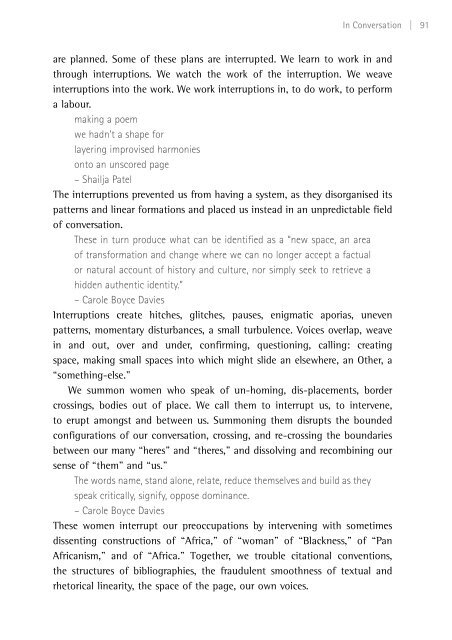Create successful ePaper yourself
Turn your PDF publications into a flip-book with our unique Google optimized e-Paper software.
In Conversation | 91<br />
are planned. Some of these plans are interrupted. We learn to work in <strong>and</strong><br />
through interruptions. We watch the work of the interruption. We weave<br />
interruptions into the work. We work interruptions in, to do work, to perform<br />
a labour.<br />
making a poem<br />
we hadn’t a shape for<br />
layering improvised harmonies<br />
onto an unscored page<br />
– Shailja Patel<br />
The interruptions prevented us from having a system, as they disorganised its<br />
patterns <strong>and</strong> linear formations <strong>and</strong> placed us instead in an unpredictable field<br />
of conversation.<br />
These in turn produce what can be identified as a “new space, an area<br />
of transformation <strong>and</strong> change where we can no longer accept a factual<br />
or natural account of history <strong>and</strong> culture, nor simply seek to retrieve a<br />
hidden authentic identity.”<br />
– Carole Boyce Davies<br />
Interruptions create hitches, glitches, pauses, enigmatic aporias, uneven<br />
patterns, momentary disturbances, a small turbulence. Voices overlap, weave<br />
in <strong>and</strong> out, over <strong>and</strong> under, confirming, questioning, calling: creating<br />
space, making small spaces into which might slide an elsewhere, an Other, a<br />
“something-else.”<br />
We summon women who speak of un-homing, dis-placements, border<br />
crossings, bodies out of place. We call them to interrupt us, to intervene,<br />
to erupt amongst <strong>and</strong> between us. Summoning them disrupts the bounded<br />
configurations of our conversation, crossing, <strong>and</strong> re-crossing the boundaries<br />
between our many “heres” <strong>and</strong> “theres,” <strong>and</strong> dissolving <strong>and</strong> recombining our<br />
sense of “them” <strong>and</strong> “us.”<br />
The words name, st<strong>and</strong> alone, relate, reduce themselves <strong>and</strong> build as they<br />
speak critically, signify, oppose dominance.<br />
– Carole Boyce Davies<br />
These women interrupt our preoccupations by intervening with sometimes<br />
dissenting constructions of “Africa,” of “woman” of “Blackness,” of “<strong>Pan</strong><br />
<strong>Africanism</strong>,” <strong>and</strong> of “Africa.” Together, we trouble citational conventions,<br />
the structures of bibliographies, the fraudulent smoothness of textual <strong>and</strong><br />
rhetorical linearity, the space of the page, our own voices.


